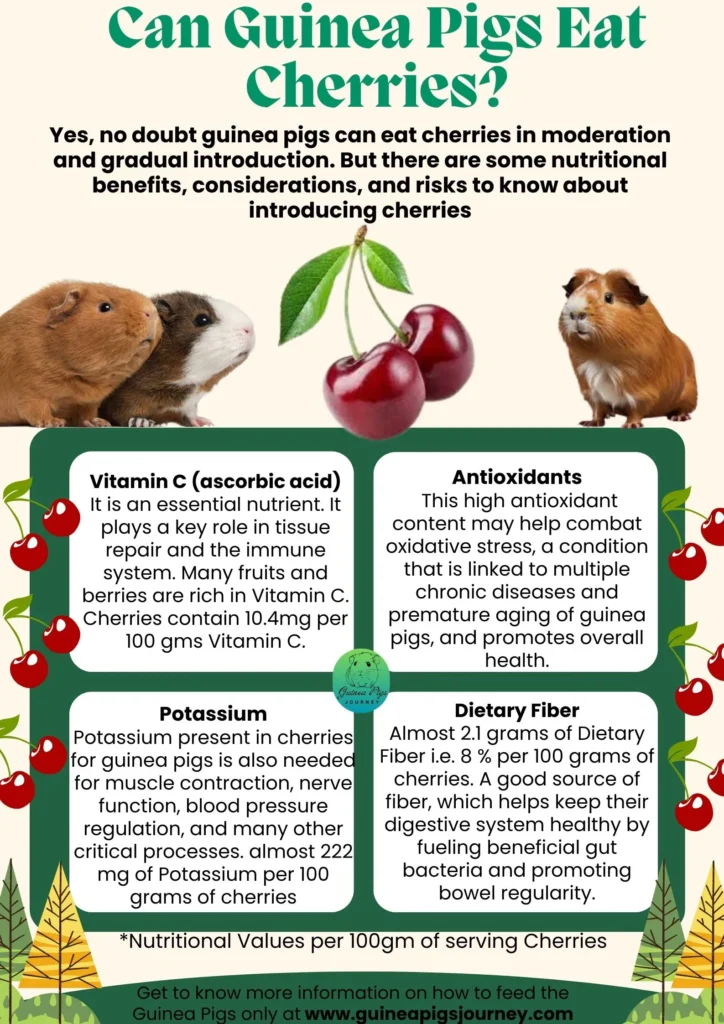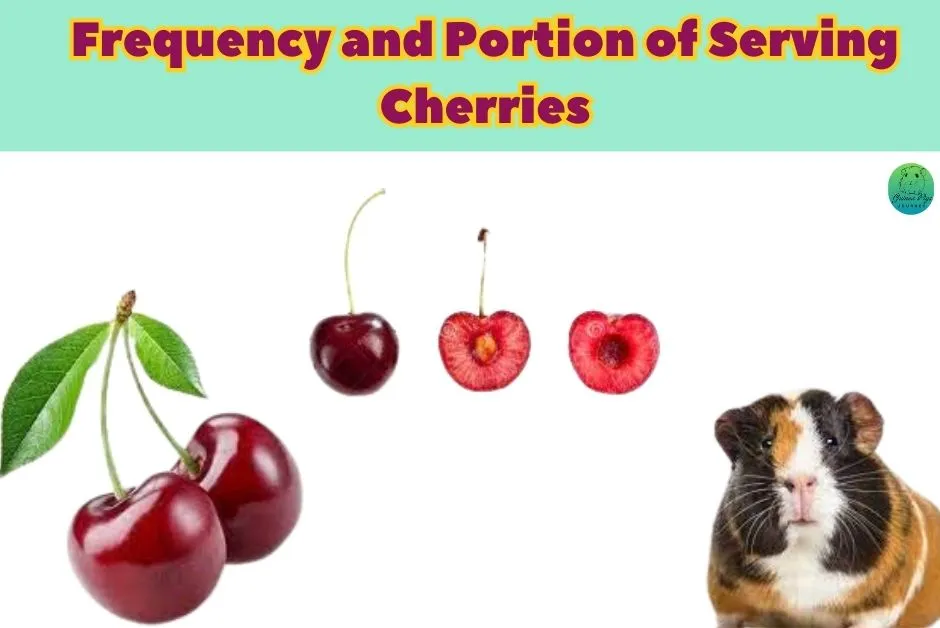Cherries! These are small stone fruits found in a variety of colors and flavors with two major categories, tart and sweet cherries, or Prunus cerasus L. and Prunus avium L., respectively. It is one of the most beloved fruits packed with deliciousness and several vitamins, minerals, and plant compounds with powerful health benefits. But there are some considerations and risks to know about introducing cherries as well and the question comes to mind can guinea pigs eat cherries?
Yes, no doubt guinea pigs can eat cherries in moderation and gradual introduction. Still, there are both the positive and negative aspects of introducing cherries in a guinea pig’s diet which is paramount for a guinea pig owner to know. So, before you decide to introduce cherries in the guinea pigs diet let’s quickly go through this valuable knowledge of cherries for guinea pigs.
This long guinea pig journey led me to a desire to investigate the cherries before introducing them to my lovely guinea pig diet. So, I have decided to share this valuable knowledge with my fellow guinea parents to understand the nutritional benefits, considerations, and risks associated with feeding cherries to guinea pigs.
Are Cherries Safe For Guinea Pigs?
Yes, cherries are safe to feed guinea pigs as an occasional treat in moderation and with a gradual introduction. Remove the pit of cherry and slice the cherry into small pieces and offer a small amount once or twice a week but just like all fruits including pears, pomegranate, nectarines, blackberries, grapefruit, honeydew melon, etc. They should not make up the largest portion and most of their diet because fruits are high in sugar and can cause digestive and gastrointestinal issues if fed in excess.

The color of cherries can vary from yellow to deep blackish-red. All varieties are highly nutritious and packed with fiber, vitamins, and minerals. These nutrients, particularly fiber, vitamin C, and potassium, benefit the health of guinea pigs in many ways. Cherries are rich in vitamin C which guinea pigs cannot produce just like humans, and they can get them from eating cherries in moderation.
It is recommended to offer cherries as an occasional treat to your furry friends to limit the frequency and size of servings and follow its serving with veggies like cucumber, zucchini, arugula, asparagus, snap peas, cilantro, green beans, mustard greens, carrots, etc. to create a healthy and balanced diet for your guinea pigs.
Nutritional Requirements of Guinea Pigs:
Guinea pigs are herbivores creatures based on a plant-based diet and their owners must know “The recommended and best diet for their guinea pigs” as well as those “Foods not recommended to feed guinea pigs” to maintain their overall health and long span of life.
Guinea pigs are herbivores creatures and graze or nibble on a plant-based diet to achieve their nutritional requirements. They have enzymes that break down veggies and fruits to make a nutritional balance for guinea pigs. Naturally, guinea pigs graze on fresh hay which makes up 80-90 % of their daily diet along with 10 % of fruits and veggies to get some important nutrients. They are also offered with some amount of recommended and designated only pallets for guinea pigs. Guinea pigs require fresh and clean drinking water at all times to ensure good health.
Guinea pigs cannot produce their vitamin C, so they require external sources like cherries and other fresh fruits and veggies to fulfill this requirement. The list of safe food including Cherries that can be fed to guinea pigs is so long that it needs great care to know the best way of feeding guinea pigs.
Nutritional Analysis of Cherries for Guinea Pigs:
Although cherries are safe to feed guinea pigs in moderation before feeding them you must know the nutritional values and percentage to make it an adjustable and most beneficial fruit with other fruits and veggies. In excess, cherries can be harmful to guinea pigs due to their high sugar content and other factors. It is very important to understand its nutritional values and percentage to achieve potential benefits and avoid the risks of cherries for guinea pigs. According to the USDA food database, listed below are the nutritional values and percentage per 100 grams of cherries for guinea pigs.
| Nutrients | Value per 100 grams | Daily Value (DV %) |
| Calories | 63 kcal | |
| Carbohydrates | 16.2 grams | 6 % |
| Water | 82.2 grams | |
| Fat | 0.19 gram | 0 % |
| Protein | 1.1 grams | 2 % |
| Dietary Fiber | 2.1 grams | 8 % |
| Ash | 0.42 grams | |
| Net Carbs | 13.91 grams | |
| Sugar | 13.9 grams | |
| Vitamin C, total ascorbic acid | 10.4 mg | 9 % |
| Vitamin A, RAE | 3 µg | 0 % |
| Vitamin B6 | 0.049 mg | 5 % |
| Vitamin K | 2.1 µg | 2 % |
| Vitamin D | 0 mcg | 0 % |
| Cholesterol | 0.00 mg | 0 % |
| Fatty Acid | 0.038 g | 0 % |
| Calcium, Ca | 13 mg | 1 % |
| Phosphorus, P | 21 mg | 2 % |
| Potassium, K | 222 mg | 5 % |
| Iron, Fe | 0.36 mg | 2 % |
| Magnesium, Mg | 11 mg | 3 % |
| Zinc, Zn | 0.07 mg | 1 % |
| Sodium, Na | 00 mg | 0 % |
| Copper, Cu | 0.06 mg | 7 % |
| Manganese | 0.070 mg | 3 % |
| Folate | 4 µg | 1 % |
Note: * The % Daily Value (DV) indicates how much a nutrient in a serving of food subsidizes a daily diet.

What Are The Nutritional Benefits Of Cherries For Guinea Pigs?
Vitamin C:
Cherries for guinea pigs contain almost 10.4 mg of Vitamin C i.e. 9 % per 100 grams of cherries, As guinea pigs cannot produce their vitamin C they require it daily almost 30-50 mg to keep their functions working. It is an essential element for maintaining the immune system and skin health of guinea pigs. It also helps guinea pigs in the prevention of a dangerous disease scurvy which can even lead to malnutrition in guinea pigs. Vitamin C also helps in the formation of collagen and tissue repair for guinea pigs necessary for the support of skin, tissues, muscles, and bones.
Potassium:
Cherries for guinea pigs contain almost 222 mg of Potassium i.e. 5 % per 100 grams of cherries, Potassium is very useful for nerve and muscle function to maintain good health at whatever stage guinea pigs are. Potassium also regulates the heartbeat and oxygen support for guinea pigs and helps in the creation of proteins and carbohydrates. Potassium present in cherries for guinea pigs is also needed for muscle contraction, nerve function, blood pressure regulation, and many other critical processes.
Dietary Fiber:
Cherries for guinea pigs contain almost 2.1 grams of Dietary Fiber i.e. 8 % per 100 grams of cherries. Cherries for guinea pigs are also a good source of fiber, which helps keep their digestive system healthy by fueling beneficial gut bacteria and promoting bowel regularity.
Antioxidants:
All types of Cherries for guinea pigs also contain high concentrations of plant compounds like antioxidants and anti-inflammatory compounds. This high antioxidant content may help combat oxidative stress, a condition that is linked to multiple chronic diseases and premature aging of guinea pigs, and promotes overall health.
What Other Benefits Do Cherries Provide For Your Guinea Pigs?
Research shows that the anti-inflammatory and antioxidant compounds in cherries for guinea pigs may help relieve exercise-induced muscle pain, damage, and inflammation. Cherries are particularly beneficial to hearts, as they’re rich in nutrients and compounds that are known to promote heart health, including potassium and polyphenol antioxidants. Cherries for guinea pigs are also shown to help the cardiovascular system and regulate cholesterol and glucose levels.
What Are The Risks Of Cherries For Guinea Pigs?

Sore Mouth due to Acidic Properties:
Cherries for guinea pigs can also cause a sore mouth because of a lot of acidity just like other fruits pears, nectarines, grapefruits, etc., which can burn your guinea pigs’ mouth and lead to the development of sores on their lips. So, it is always suggested that go with moderation to avoid such conditions for your little furry friends.
Constipation:
Although, fiber is very good for the digestive system, especially for guinea pigs having very sensitive digestive systems, at the same time eating too much cherries can result in constipation despite the fiber content in cherries if they consume too much cherries means consuming too much fiber. So it is very important to keep their diet well balanced and in moderation.
High Amount of Carbohydrates:
As we know guinea pigs perform well on a diet low in carbohydrates and fats. Important to note is that all fruits are relatively high in carbohydrates or sugar may be harmful if consumed excessively by guinea pigs. Overconsumption of cherries for a long time may result in blood glucose spikes eventually leading to weight gain or obesity that may even lead to diabetes.
Diarrhea:
Guinea pigs may also go through diarrhea when they consume too many cherries in a single sitting or daily. Diarrhea may also cause so many health-related issues for your guinea pigs so you need to be very careful in traducing any new food in a recommended amount.
Allergic Reactions:
Guinea pigs may also go through the signs of allergy due to the consumption of cherries. It is always recommended to watch for any kind of allergic sign like itching, behavior change, or any other symptom that is very unusual for you and your guinea pigs. It may also depend on Individual guinea pigs’ preferences for cherries, some may be allergic to cherries and some may adjust it very easily.
How Often Can Guinea Pigs Eat Cherries? (Frequency and Portion of Serving Cherries)

Always opt for fresh, raw, and organically produced cherries for guinea pigs because these contain much more potential nutrients than cherries that are old and wilted. It is also recommended to wash the cherries before feeding them to your furry friends to get rid of pesticides, chemicals, diet particles, or anything being sprayed during harvesting or in stores to avoid the risk factors.
It is recommended to first remove the pit, leaves, and stem of the cherry before feeding it to your guinea pig. You can serve one cherry, two times a week at most, per guinea pig keeping in mind other fruits in their wish list of serving. You can also slice it into small pieces to make it a good and easy treat for your cavies.
You can also serve them ½ the amount of cherry i.e. half a slice of cherry in the morning and the other half in the evening to ensure moderation and gradual introduction.
In the end, the most important task to do is when your guinea pigs are done eating cherries, be sure to check and remove the uneaten cherries from the cage or their surroundings to avoid the multiplication of bacteria and inviting flies that can be harmful to guinea pigs.
Can Guinea Pigs Eat Cherries All Parts?
Just like all other fruits and veggies, it is not recommended to feed all parts of any plant or fruit due to some important considerations that we will discuss which part of the cherry is safe to feed to guinea pigs.

Can Guinea Pigs Eat Cherries Stems?
No, guinea pigs cannot eat the stems of cherries because studies have found that there are some traces of cyanide in the stems of cherries which can be dangerous for your guinea pigs even leading to death in some cases.
Can Guinea Pigs Eat Cherries Pits?
No, do not feed pits of cherries to guinea pigs as they also contain traces of cyanide just like the seeds of apples according to a study which can lead to dangerous health-related issues for guinea pigs or eventually lead to death. So, it is recommended that always remove the pits from cherries before serving them to your cavies.
Can Guinea Pigs Eat Cherries Tree Leaves?
No, do not feed leaves of cherry trees to your guinea pigs because according to a study. It also contains traces of cyanide (HCN) in the bloodstream; this toxin is very potent for guinea pigs if consumed even leading to death. Leaves of cherry trees are also serrated which have a small toothed edge that can be very bad for guinea pigs making their throat and body in trouble while biting or eating.
Can Guinea Pigs Eat Cherries Tree Branches?
No, do not feed the branches of the cherry tree to your guinea pigs because it also contains prussic acid which converts into cyanide after some time once the leaves get wilted which can be very dangerous for your furry friend’s life.
Can Guinea Pigs Eat Cherries Tree Blossoms?
No, do not feed your guinea pigs the blossoms of the cherry tree as it also contains the traces of cyanide just like other parts of the cherry tree. Just stick to the flesh part of the cherry packed with beneficial nutrients for your guinea pigs.
Can Guinea Pigs Eat Dried Cherries?
No, do not feed the dried cherries to your guinea pigs because the cherries are already rich in sugar content, and making them dry after processing by adding more ingredients, additives, seasonings, much more sugar, and flavor makes it much more dangerous for guinea pigs overall health and digestive system. According to Food Database Central, the dried cherries contain five times more sugar content than the raw ones which also suggests that do not feed dried cherries to Guinea pigs.
Can Guinea Pigs Eat Canned Cherries?
No, do not feed canned cherries to your guinea pigs as they contain high levels of chemicals, preservatives, sugar, and artificial flavor which can be dangerous for guinea pigs’ sensitive digestive systems as guinea pigs cannot digest such food with high amounts of sugar, and other ingredients making it a bad option for guinea pigs. Always offer fresh, raw, and organically produced cherries to guinea pigs.
Can Guinea Pigs Eat Frozen Cherries?
No, it is not recommended to feed frozen cherries to guinea pigs which can cause diarrhea and stomach upset as well as some serious digestive issues. Always offer them organically produced, fresh, and ripped cherries to avoid any risk factors. Even if cherries are cold and you take them out from the freezer, do not directly serve these cold cherries to guinea pigs. Always make them cool down at room temperature and serve them in moderation to get potential nutrients for the better health of guinea pigs.
Can Guinea Pigs Eat Cherries Every Day?
No, do not feed the cherries to guinea pigs every day because it contain a high content of sugar making it a bad option for guinea pigs if served daily which can cause weight gain or obesity for guinea pigs. It also contains fiber content and feeding it daily to guinea pigs may cause constipation as well as stomach upset.
So, always feed cherries to your guinea pigs in moderation and with a gradual introduction, and also monitor or observe any reaction of cherries for guinea pigs. If you find any do not hesitate to give a call to the veterinarian for a medical checkup and best guidance.
Can Baby Guinea Pigs Eat Cherries?
No, do not feed the cherries to baby guinea pigs, wait till the age of 4-6 weeks then you can offer baby guinea pigs a half or one cherry, one or two times a week. Baby guinea pigs cannot digest the high sugar fruit very easily and feeding cherries to guinea baby guinea pigs can be very dangerous for their overall health and life.
Alternatives to cherries for Guinea Pigs:
Guinea pigs love to nibble on cherries but individual preferences may vary and some guinea pigs may like or dislike the cherries in their diet, so there are some healthy alternatives to cherries that can be alternative for healthy nutrients.

Fresh Fruits in Moderation: Fresh fruits like pears, grapefruit, nectarines, blackberries, pomegranate, honeydew melon, watermelon, peach, etc. can be fed in moderation as an occasional treat to gain important vitamins and minerals for guinea pigs.
Fresh Leafy Greens: Fresh leafy greens such as arugula, mustard greens, cilantro, wheatgrass, rosemary, etc. in moderation can be a tasty addition to a guinea pig’s diet. These greens are rich in essential nutrients and are a staple in their diet.
Fresh Vegetables: Fresh veggies like snap peas, asparagus, butternut squash, zucchini, and green beans, can also be added as a treat to fulfill their nutritional requirements and gain many important vitamins and minerals.







